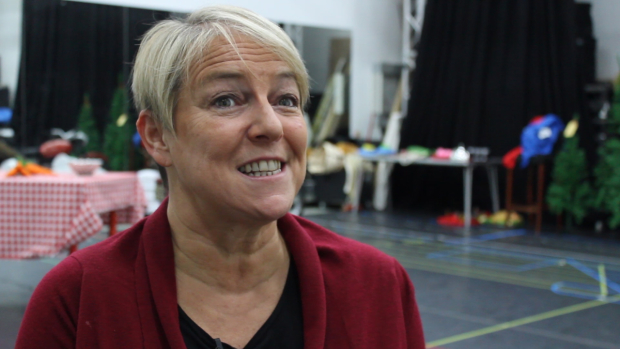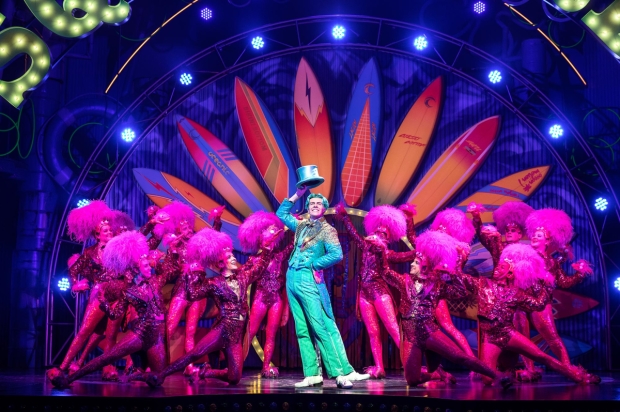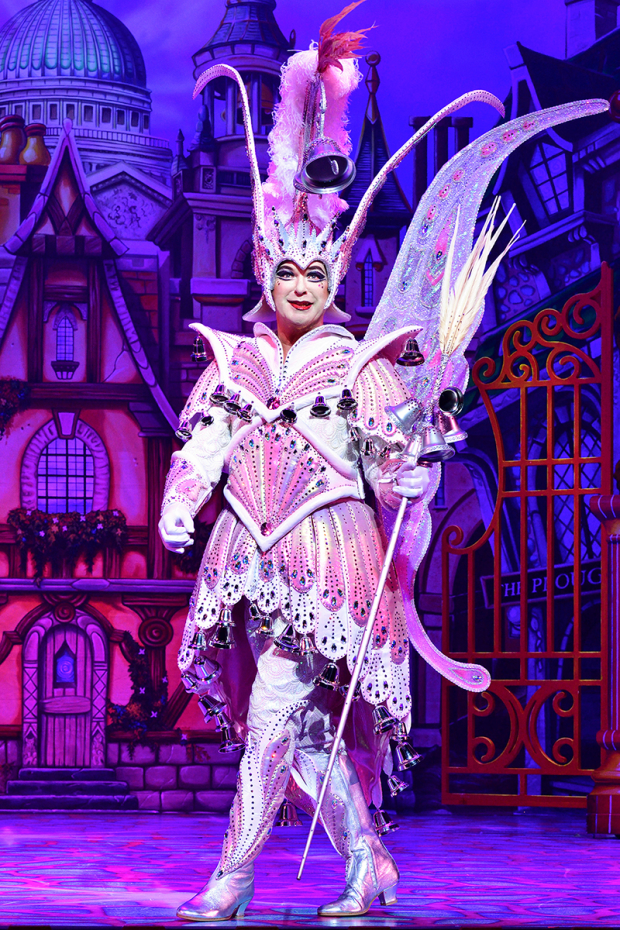New York round up: A best new musical in The Band's Visit and will Waitress cross the pond?
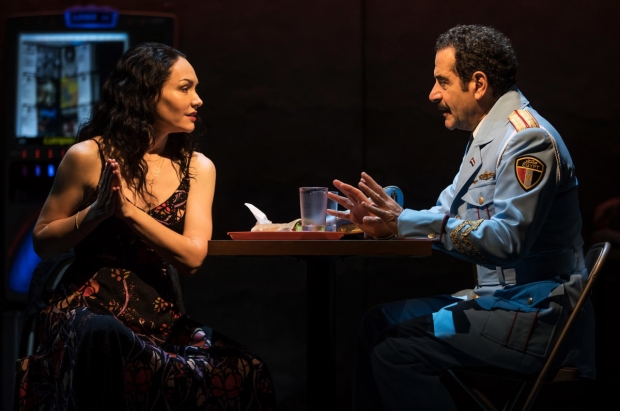
© Matthew Murphy
Within a week of opening, there’s a general consensus around New York that the season’s best new musical nomination has been sorted. The Band’s Visit, at the Ethel Barrymore, based on a 2007 documentary film about an Egyptian band turning up at the wrong Israeli town on a cultural assignment, is enchanting and full-hearted like the best Broadway musicals but low-key, subtly constructed and genuinely humane as so few of them are.
Instead of taking the bus to Petah Tikva, the ensemble in powder blue uniforms, hairstyles in varying degrees of bushiness and peaked caps wash up in the backwater of Bet Hatikva where nothing happens except the low moan of boredom and disappointment. Their 24-hour impromptu sojourn before finding the right bus is quietly catalytic as they impact on a local rocky marriage, thwarted adolescent relationships and human expectations generally in and around Dina’s cafe, or Dina’s diner.
The comparatively unknown but experienced Katrina Lenk as Dina gives the sort of break out performance that is the stuff of Broadway legend, hips jutting and hair flowing in a smouldering, Anna Magnani-type turn that is as powerful as it is understated and deftly controlled. Her friendship with the widowed conductor (Tony Shalhoub) is the pivotal centre of a piece that revolves, like the stage itself, with discretion and ease in the music and lyrics of David Yazbek, the design of Scott Pask and the direction of David Cromer.
The Band's Visit is a far cry from the musical wallpaper that is Anastasia
The show comes from the little Atlantic Theater, a key forcing house of new musicals in recent years, and Yazbek’s score, mixing lyric and comic numbers with a pronounced Middle Eastern spice, is as good as his best work on shows like Dirty Rotten Scoundrels and Women on the Verge of a Nervous Breakdown. And a far cry from the bland yards of musical wallpaper in the latest fairytale panto for kids, Anastasia, at the Broadhurst, in which our own Caroline O’Connor is making a gallant bid for Broadway stardom as a hard-boiled Russian countess kicking up her heels in Paris exile. She very nearly succeeds, without exactly laying the ghosts of Merman, Martin or Stritch; the audience, after all, don’t know who she is.
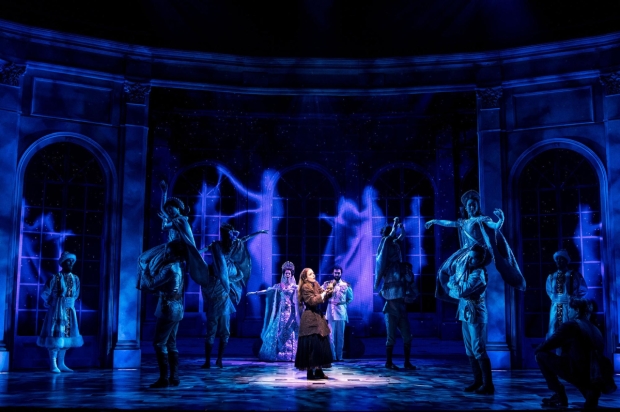
© Matthew Murphy
The Anastasia story is that of the young Romanov princess who allegedly survived the storming of the Winter Palace. But Anya (sweetly played by Christy Altomare) may also be an amnesiac commoner, groomed for the royalty gig by a couple of vaudevillian shysters, and this unwitting evocation of My Fair Lady only underlines how far we are from the real deal. Terrence McNally’s book follows both the 1957 Ingrid Bergman movie (scripted by Broadway legend Arthur Laurents) and the 1997 animated cartoon. The ordinary music and lyrics are by Stephen Flaherty and Lynn Ahrens, whose Once On This Island, also scripted by McNally, has just been revived and rapturously received, too, though when I saw the show years ago it never struck on my box, either. The one thing Anastasia really does have is splendiferous realistic photographic design by Alexander Dodge and Aaron Rhyne, with a succession of palaces, ballrooms, Parisian high spots and locations whirring past in colourful and detailed profusion. And for a certain kind of Broadway audience, this really is enough, and good luck to them.
American resilience is in full force as the show goes on for
Radio City Christmas Spectacular
I prefer my photographic realistic design in its properly kitsch setting of the Radio City Christmas Spectacular which strikes me, this year, as good and as sumptuous as it's ever been, with the ever present (since 1933) nativity scene and the collapsing wooden toy soldier routine by the wondrously well-drilled cadre of three dozen high-kicking Rockettes. I saw the show just a couple of hours after the thwarted, but still disruptive, terror attack at the Port Authority bus station on Monday morning, and the fact that the show went on and the audience of 5,000-plus struggled through the travel chaos to get there for an 11am start (the spectacle plays four times a day through the holiday season; if you’ve never seen it, you must) was a tribute, as the civic officials say, to the resilience of the American people, the bridge and tunnel crowd as well as the inner city dwellers and the tourists.
It's not yet certain that Waitress will cross the pond
A heavily delayed flight from Heathrow last Friday meant I missed a visit to the irresistible-sounding Waitress at the Brooks Atkinson. It's by no means certain, so far, that this adaptation of a 2007 indie film about a Texan waitress who dreams of baking a better life will cross the pond. The reverse trip has been made by Mark Rylance, now playing previews, in Claire van Kampen’s Farinelli and the King at the Belasco, scene of the best recent revival of Follies (pace the, to me, ludicrously enthusiastic admirers of the current National Theatre production) by Matthew Warchus, before the magnificent restoration was completed.
At first sight, the Belasco seems too barn-like for a show in which Rylance continues to seduce by stealth an audience intrigued by this depressive monarch who goes fishing in a goldfish bowl and medicates on a series of sensational Handelian baroque arias sung by a court castrato. In fact, as in London, the castrato’s an unsnapped counter tenor, to whit the peerless Iestyn Davies, who’s signed up to the New York Met for the next five years.
The candlelit intimacy of the stage is cleverly extended through the Art Deco lamps and lighting in the vast auditorium and Rylance, without raising his voice once, and on his first return to Broadway since winning an Oscar, looks set to find his love for the audience in this eccentric and beguiling play fully paid back, and with interest.



